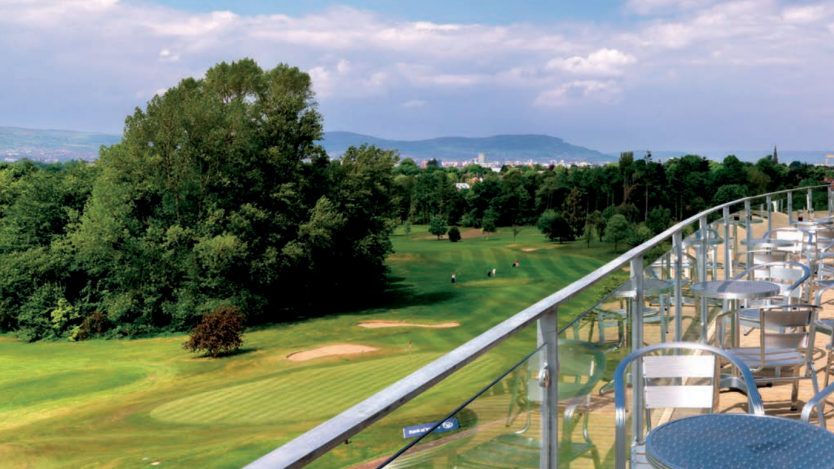After a succession of franchisees, Belvoir Park made the bold decision to take their F&B provision in-house four years ago. General Manager Jim Cullen talks about how they’ve made it a big success…
There’s some security in having a franchisee. It’s an area of the business that you don’t have to worry about on a day-to-day basis.
If what members are getting doesn’t meet the mark, you can always bring in a new operator – although that’s not always the best solution. But food and beverage provision could be a significant proportion of a club’s revenue. For those that go it alone, and leave the comfort blanket of a franchised business, the risks of taking on extra responsibilities can be outweighed by the rewards.
Belvoir Park took their provision in house four years ago and have since developed a reputation for excellent dining. Found close to Belfast city centre, food and beverage now forms a crucial part of the club’s business. We asked general manager Jim Cullen, who is also GCMA regional manager for Northern Ireland, why they made the switch, what the results have been and got his top tips for clubs thinking of doing the same…
What is it about your F&B offering that has been so successful?
We moved away from a franchise and this is our fourth year. It has certainly taken us a lot of time and effort to get it to where it needs to be. Our turnover is probably around £700,000 a year and we focus on good quality food, with added value. We look at the trends in the marketplace. We make sure the menus are attractive. We have specials on every day, which change every day – and sometimes twice a day – to make it interesting. We have created a nice coffee culture within the golf club as well as a business lunch trade. We have a lot of members who are business people and want somewhere to take their clients. Getting into Belfast can be a problem in relation to parking, so coming to the golf club is a big plus for them. It’s got lovely views and the restaurant is fantastic. There is a wow factor as there’s a great 180 degree of the golf course, Cavehill Mountain, Black Mountain, Belfast city centre and the famous Harland & Wolf. It just is a fabulous place.
What is the key to a good F&B offering?
You’ve got to be at the top of your game as far as the quality of the food is concerned. If the quality of food is good, people will certainly come and they will pay the money for it as well. We offer good, simple, wholesome food, with deep flavours. It’s honest and with a fine touch. We provide traditional food, a la carte, bistro and some homemade produce such as scones and pastries. We make it attractive for people to come and I suppose that’s the key factor.
You make it sound very simple. I imagine there’s a lot of hard work that goes into that…
That’s where your staff come in and why I, as general manager, need to be totally reliant upon the structures we have in place and the food and beverage management team. We have two duty managers and two duty supervisors, so we always ensure there is a key person on board at all times to make sure everyone is looked after. It’s hard work to keep on top of it. We commit to a food and beverage management meeting every week, for a minimum of one hour, to discuss what’s on and the next two weeks’ diary . We look at the menus and change them as regularly as we possibly can. As a food and beverage business, you need to be aware of what your members want and are looking for. Good quality food is certainly attractive and it has to be added value for them as well too.
You sound like a restaurant rather than a golf club. Was that the intention?
It was always our intention from day one. We never liked the term ‘we are only a golf club’. We wanted to take it a step further. We have an absolutely magnificent facility and we wanted to make sure we accommodated all our members, guests and visitors. Our location is five minutes from the city centre, so it was always our intention to be more than simply a golf club, and more than simply golf club food. It had to be something different.
When you do something different, and you prepare high quality food, you can get the keener price as well. That’s how it is built, but it is also built on service. Our staff are trained in the WorldHost programme. They are all trained to look after people when they come in, make sure the service is good, make sure people feel welcome and are looked after. We were very aware when we had the franchise that we were losing business. The turnover wasn’t there and the quality wasn’t there. I started in 2012 and within a year we went through two franchisees. We made the decision that, if we wanted to move it forward, we needed to control it ourselves. We knew the market existed and we knew the members would come back if we supplied good quality food and it was treated as a restaurant. That’s what happened. They were very supportive from day one. But we had to be sure we had a good quality head chef and a good team around him as well.
There’s often comfort in having a franchise. Was it daunting to go it alone?
Absolutely. It scares the living daylights out of you. You have to make a commitment to your club council, and management team, to say ‘we can make this work’. We made a commitment that we would give it the time required and make it work. We also understood this would not happen overnight and realistically budgeted for a loss in year one. Our key focus was to source good quality people. We had to find a good quality head chef and a good quality hospitality manager. Members asked ‘why do we need a hospitality manager?’ It took them a while to understand that we needed someone to run that side of the business. I can overview it but I can’t be there 24-7 running the food and beverage section. I didn’t have the skillset either. I needed to bring in people who had that skillset. But it wasn’t easy. It’s a tough trawl and you need to take risks.
Now it’s a fundamental part of your business…
It’s a big chunk of our revenue. The challenge we have is maintaining gross profit, which is always a constant battle. You have to be wise about how you do things. Controlling the wages cost is also a big issue. You grow from a very small bar team to, all of a sudden, an F&B service team and kitchen staff of more than 30 – quite quickly and dramatically. You have got to cover those costs. We took advice from restaurateurs around Belfast. We got them to talk through a business model that would work, and how it would work. There was a big learning curve, not only from club managers and duty managers but also from the serving staff. It takes a bit of time for people, whom you may have employed for 10 or 15 years, to come to terms with their role and job description changing. We were asking them to do different things and we were asking them to step outside of their comfort zone. That can be the hardest fight.
Presumably there were all kind of new things to learn – gross profit, managing stock, loss and people?
You have to manage that business. From a club manager’s point of view, I have experience in managing businesses and you look at what it’s going to contribute for the club. You look at what your expectations are. We will not achieve the gross profit of a normal restaurant in the city centre. That would probably be 70 to 75 per cent plus. Our gross profit is running at 62, which is acceptable to our business. But we know the members won’t pay (restaurant prices) and that, with the discounts we give, we have got to make sure there is still good quality. It’s pressure on your bottom line and you’ve got to control your wages costs. We introduced key performance indicators and we monitored our turnover every week. We constantly reviewed our gross and nett turnover and allowed for VAT. We looked at our gross profit on a weekly basis, our wages cost on a weekly basis and we looked at our bottom line. You need to keep on top of that and it does bring another avenue of information that you have to collate, join together and monitor. If you don’t do that it can run away from you very quickly.
What advice would you offer to managers looking at taking on their F&B offering – or just trying to improve it?
There are a couple of core things. It’s knowing the expectations of your customer base and understanding what your members want. We do run it as a restaurant, and we put on functions, but we don’t necessarily have a lot of success with big band nights. We know that. We also know we are very successful at gourmet nights and a la carte nights. We offer a la carte on a weekly basis and have a gourmet night four to six times a year. It’s fine dining and selling a five-course menu for just under £50. They sell out and we know we have a membership base that wants high quality food and wine. You have to understand your customer base and what they want. If you feel you are ‘only just a golf club’ and you want to serve basic burgers, fish and chips and lasagne and chips then that’s fine, so don’t try to be something you are not. But you might find it difficult to make money from that, or a good contribution, so you’ve got to understand your customer base. You’ve also got to be realistic.
We will not achieve 70 per cent plus gross profit. It is impossible for us with the discounts we give to members. We can offer a great gourmet night but we also know we have got a lot of senior members, for example, who want good wholesome food. We have members who come in on a Wednesday and just want liver and onions, with chips. We still supply that, and price it accordingly, but we also make sure we can still make a reasonable profit. Crucially, you’ve got to measure your performance on a regular basis. If you don’t do that, it can very quickly run away from you. You’ve got to be adventurous and try different things. We have tapas nights and certain theme nights. We’ve moved away from the formal black tie night at New Year and the first event we had was a street market theme. The second was a gangsters and molls theme and last year it was the circus.
That takes it away from the day-to- day things you are used to doing.
People will change and will adapt. The excitement brings that bit of interest from the members, and more importantly enhances enthusiasm from the staff.

